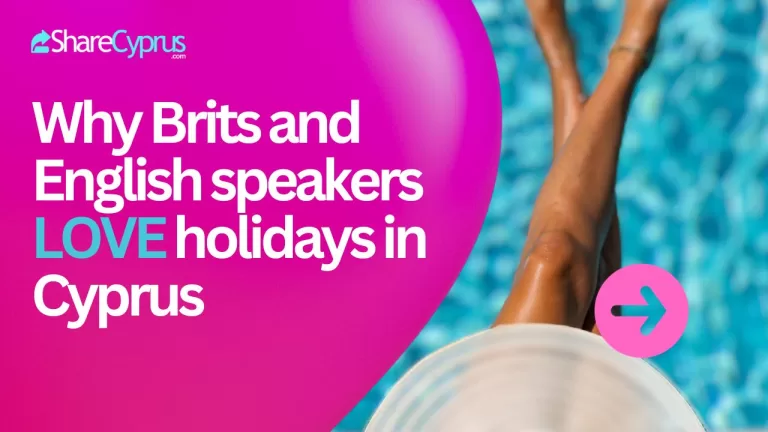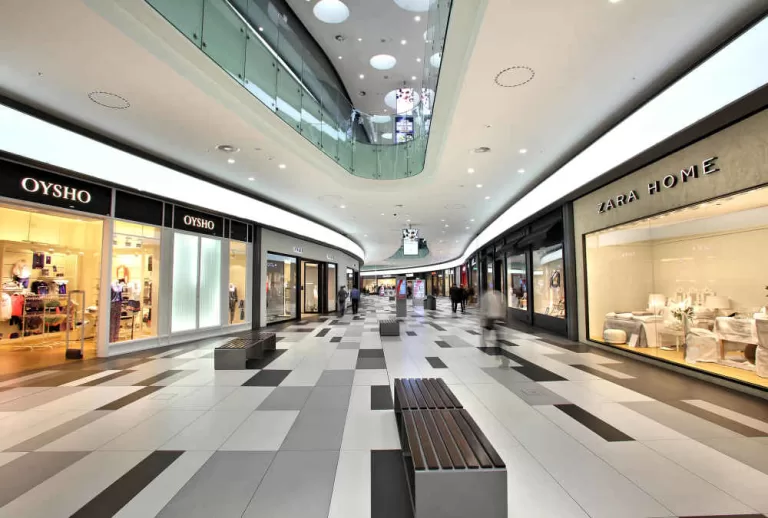

Home / ShareCyprus Special Features / Cyprus. The perfect holiday destination for British people.
Holidays in Cyprus are popular with British travellers and for anyone who speaks English as a first or second language.
Millions of Brits and English-speaking tourists choose Cyprus and places such as Ayia Napa, Larnaca, Limassol, Protaras, and Paphos.
However, there’s room for many more since visitor numbers are still lower than before the Covid-19 pandemic.
Official figures confirm that British tourists continue to make up the largest proportion of visitors to the island annually, and there are many reasons for this, as you are about to discover.
Our short ninety-second video below offers ten reasons why Cyprus is a perfect holiday destination for British holidaymakers (there are many more).
As you can see from our video, there is a strong British influence here in Cyprus.
This is because Cyprus was a British colony from 1878 until 1960, which is not that long ago but it was at the time when electricity was first introduced (1903), and when the first motorcar was imported to Cyprus by a Limassol doctor (1907).
Due to this, there are a few things that often surprise first-time visitors to Cyprus.
For example, we are one of the few European countries that drive on the left-hand side of the road like in the UK (with the steering wheel on the right of the car) and also why British plug sockets are also the norm!
Since we live here and have done so for years, we don’t give this a second thought. It’s just “the way it is”, and people who live here or visit regularly often forget that new visitors probably don’t know!
In fact, we know they don’t because tens of thousands of Brits arrive here yearly with an unnecessary array of European plug adaptors. In contrast, travellers from Europe and elsewhere arrive blissfully unprepared.
It is often a shock for first-time visitors from the UK and elsewhere to get into a taxi or pick up a hire car and realise the driver is sitting on the right.
Sorry if we have spoilt any surprises for you; they don’t end there.

Many well-known companies and brands that are popular in the UK also operate in Cyprus. Brands you will spot include Marks & Spencer, LIDL, Next, Costa Coffee, Starbucks, Pizza Hut etc.
Well-known products are also available in almost every supermarket and corner shop. All the favourites, including chocolate bars, tea bags, beauty products and more.
In addition, many supermarkets also stock branded items from the major UK supermarket chains, so don’t be surprised to see items from TESCO, Sainsbury’s, Iceland and Waitrose.
Shopaholics will be delighted to know that each city has at least one major shopping mall.
All major UK newspapers are readily available seven days a week. The latest editions are printed daily and available by around 7 a.m.
If you want to immerse yourself in the news from Cyprus, that’s also easy, thanks to the Cyprus Mail. This high-quality English-language newspaper has been circulating since 1945 and is published six days per week (every day except Monday). There is also a monthly publication called The Paphos Post. This is often free of charge in the Paphos region and can be purchased in other parts of the country while stocks last.
And you can enjoy your favourite newspaper while enjoying a full English breakfast. Most hotels, restaurants, cafes and bars serve an almost perfect English breakfast (many provide Heinz ketchup, and some also offer HP sauce!). You can also enjoy a delicious Sunday roast in the coastal towns and cities.
That said, please don’t think Cyprus is Blackpool with sunshine. British visitors also enjoy soaking up local food and culture.

Cyprus offers a delightful blend of stunning landscapes, rich history, warm hospitality, and vibrant culture.
From sun-soaked beaches to ancient archaeological sites and delectable cuisine to bustling markets, Cyprus provides a memorable and relaxing experience for British travellers seeking an unforgettable holiday escape.
Let’s explore this further.
Cyprus offers accommodation options for every type of person and budget.
Our video below features one of the best luxury hotels in Cyprus (The Elysium in Paphos), which is rated as “exceptional” on booking.com (click here to discover more).
Another great place to discover some of the best luxury hotels in Cyprus is via Indulgent Escapes by Jet2holidays. All the hotels featured are highly rated and recommended by the team at Share Cyprus, without exception.
If you want to live like a local, that’s possible too.
The choice from tiny village houses to multi-million euro villas and apartments is almost endless. For example, we recently booked a ‘secret stay’ at a luxury apartment in a wonderful building called The Icon in Limassol.
The owners did not know a team from Share Cyprus had made the booking or that they would be taking photos and making a video. The video is below, and you can read more about our secret stay here.
Cyprus has many breathtaking beaches, many of which have been awarded a blue flag for cleanliness.
Whether it’s the famous sandy stretches around Paphos, Ayia Napa, Protaras and Larnaca or the more secluded coves along the Akamas Peninsula, there’s a beach to suit every taste. Some are busy offering a ‘party’ atmosphere while others are secluded. If you want to avoid crowds, that is always possible, even at the height of the season.
There are also many beautiful harbours and town squares to enjoy in the evenings.
The following videos will give you a good idea of what to expect, starting with our video 24 hours in Paphos, filmed at the height of the summer season (August 2023).
British holidaymakers looking for vibrant nightlife won’t be disappointed.
All towns and cities in Cyprus offer clubs, bars, and entertainment venues, and Cyprus is now also home to Europe’s largest casino and resort.
Here’s a selection of videos to “whet your appetite” about nightlife in Cyprus.
Cyprus’s history spans thousands of years, leaving behind a treasure trove of archaeological wonders.
British travellers can explore ancient ruins, Byzantine churches, and medieval castles that offer glimpses into the island’s intriguing past.
Cyprus is a modern European country, so international food (Italian, Chinese, Indian, Thai, Japanese etc.) is available everywhere. In addition, many local dishes are very popular with British tourists.
Cypriot cuisine blends traditional Mediterranean flavours with influences from Greece, Turkey, and the Middle East. From fresh seafood to succulent grilled meats and delicious meze spreads.
If you are looking for a lazy beach holiday, that’s no problem, but there is so much more to do in Cyprus than lazing by the pool, sunbathing on the beach and enjoying spa treatments (as lovely as that is!).
We have water sports, hiking trails, off-road excursions, quad biking and go-carting. We have several marathons each year too.
There are three large waterparks spread equally across the country.
Paphos has a large, well-run Zoo, and there are various aquariums elsewhere.
Cyprus also has a new planetarium just outside Nicosia.
History enthusiasts can explore ancient sites and museums.
You can also keep up to date with the latest movies, which are in English (with Greek subtitles), in most cinemas.
Cyprus is popular with cyclists (especially outside of the scorching summer season) and, as you will see in the video below, is also home to some fantastic golf courses too!
Here are some videos to help you discover more.
We are often asked, “When is the best time to come on holiday to Cyprus” and the answer depends on the type of holiday you seek.
Regarding the weather, here’s a breakdown of what you can expect throughout the year.
February can be cold with rainy days, but it’s milder than the UK.
Many visitors who don’t enjoy hot weather choose to spend time in Cyprus during these months. Believe it or not, you can even Ski here in the Troodos mountains if you time your visit correctly.
Cyprus begins warming up during March and April, but we still have chilly/rainy days, and the evenings are always chilly. That said, this is a beautiful time to visit Cyprus as the island is full of flora, very different to what you may see later in the year. This is the time of year when many cyclists and golfers visit Cyprus.
From May until October, it’s sunshine all the way.
The evenings, sea and swimming pools can still be chilly in May, June and again in October, but July, August and September are full of hot summer days and lovely warm evenings.
We also have many lovely warm days in November and December, but the nights can be cold.
Another huge benefit for British and English-speaking tourists looking to enjoy a holiday in Cyprus is that English is spoken almost everywhere. Road signs, notices and menus are also in English.
This isn’t because many Brits can’t speak Greek. It’s much more complicated, as we will now attempt to explain briefly.
Firstly, as confirmed by the Constitution, Cyprus has two official languages, which are Greek and Turkish.
Greek is the dominant language in the Republic of Cyprus (where most tourists travel), but this isn’t straightforward because Cypriot Greek is different from “Greek Greek”.
The next thing to consider is that Cypriots study English from a young age. This is because many travel abroad to attend university. In particular, lawyers, doctors and accountants must speak English to a high standard in Cyprus. Many Cypriots also love English language music and movies.
In addition, it’s also worth noting there are many British and South African Cypriots who grew up speaking English and Greek.
Next, it’s also good to remember that although the largest percentage of tourists coming to Cyprus are from the UK, we also welcome hundreds of thousands of visitors from many other countries, including Germany, Poland, Israel and beyond. We also have an international workforce, especially throughout the service industry. As a result, many people you will meet here can’t speak the local language either!
Therefore, while you may want to say hello, please and thank you in Greek, this may be a waste of time.
Our advice? Don’t assume the person you are speaking with is Cypriot. Instead, ask them where they are from. This is polite and will ensure you don’t find yourself thanking someone from Bulgaria in Greek.
If the person you are talking to says they are Cypriot, and you want to try your Greek, please go ahead. This will be appreciated but not expected.
Share Cyprus is new, but we offer many fantastic video guides similar to those above very soon.
To be notified when our new videos are published, we’d be grateful if you could subscribe to us on YouTube. It’s free of charge!
Please note:
To subscribe and receive notifications from YouTube, you’ll need to…
1) Have or create a free account (on YouTube).
2) Then take a moment to go to our page.
3) Once on our page, press the “subscribe” .
4) To receive notifications, press our channel’s little ‘bell” icon.